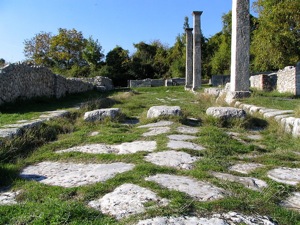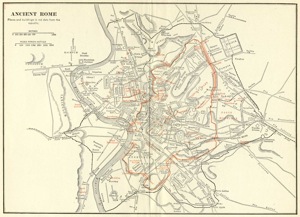Spring 2011
Tuesday 16:00-18:20; Rhode Island Hall 008
Instructor: Prof. Jeffrey Becker
Email: Jeffrey Becker
Office: Rhode Island Hall, room 009; office telephone: 401.863.2008
Office hours: Monday and Wednesday 13:00 to 14:30 or by appointment.
Course Description:
This graduate seminar approaches the urban and rural landscapes of peninsular Italy from the Early Iron Age until the Gothic Wars, with the goal being to examine key points of intersection (and departure) between the spheres of ‘town’ and ‘country’. In adopting an holistic approach to these categories that are often juxtaposed, the seminar aims to address important issues related to the development of the landscapes of ancient Italy. The seminar’s approach, then, will be to delve into various issues and topics that pertain to said landscapes, considering ‘town’ and ‘country’ both comparatively and discretely. The relationship between the two will be considered, as will various manifestations that link the two spheres together – economy, infrastructure, ritual. The course of the seminar will also aim to address changes in Italy over time, with the concluding seminar given over to a discussion of late Roman (and post-Roman) realities in the archaeology of Italy. In order to contextualize Italian landscapes across both time and space, we will consider issues pertaining to urbanism, economy, production, infrastructure, administration, architecture, epigraphy, and iconography (among others). The seminar will involve a substantial amount of student-led discussion and the discussion and presentation of student research.
Brown University Library Resource Guide for Archaeology
- The online resource guide for Archaeology & the Ancient World via Brown University Library
Textbook
- Kathryn Lomas. 1996. Roman Italy 338 BC-AD 200: A Sourcebook. London: Routledge. ISBN: 1857281802.
Course Requirements
- Participation and attendance. The seminar can only be successful if its members are consistently present, thus the regular participation and attendance of students is essential. 10%
- Oral presentations. Each student will make a series of oral presentations, outlined below. 30%
- Presentation and critique of assigned readings (2): During the course of the seminar, each student will choose two (2) readings from the syllabus (from among those marked with an *). It will then be the responsibility of the student to present and critique that reading for the seminar meeting to which it pertains. Ideally we will have two presentations per meeting. As part of this assignment, each student will submit a critical response (800-1000 words) for each of their chosen readings (thus, two essays in all). These responses should be more about critical response and reaction to content and method as opposed to summaries.
- Critical response to another participant’s research presentation (1): By the mid-point of the seminar, students will pair up to begin preparing the critical response to the final research presentations offered at the end of the seminar. Each student will be responsible for serving as the respondent for one other student’s presentation and helping to moderate the discussion following the presentation.
- Research presentation. Each student will prepare and deliver a 15-minute, conference-style presentation of his/her final research project. These presentations will occur during the final two seminar meetings (May 3 and May 10). The presentations should be illustrated as appropriate and accompanied by a professional handout. The presentation will be evaluated both on the basis of its content and the style/mode of its delivery. It is important to bear in mind that all of that material one covers in a long written paper may not fit in the space of a 15-minute oral presentation. 20%
- Final research product. The ultimate goal of this seminar is for each student to develop and complete a substantial final product. While the most obvious form is a substantial written text, the instructor is open to discussion about other possible media and format for the final product. The written product, which will likely be elected by most participants, should be a professional and polished paper on the order of 8,000 words. This written product should be professional and should adhere to proper citation format and observe rules of proper spelling, syntax, and style. The objective should be to produce a final product that is ready to be submitted to a scholarly conference or journal. The instructor is happy to work closely with each student to develop compelling and productive topics for this research. 40%
n.b. A reading knowledge of Italian is not required for the successful completion of this seminar.


